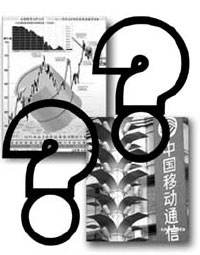The world is being constantly told of China's rise. Last week, a column appeared on The Financial Times website showing of the world's top 10 companies, four are Chinese, namely PetroChina, China Mobile, the Industrial and Commercial Bank of China and Sinopec. While another four are from the United States - Exxon, GE, Altria (the parent company of Philip Morris) and Microsoft.

These, I suppose, are measured by their market capitalization, namely their current worth as reflected by the stock market. And by stock market valuation that China has some of the world's largest companies is nothing new to Chinese readers - now that the Shanghai stock market has seen its general index rise nearly six times in one-and-a-half years.
Admittedly, as investors know, there have been a lot of bubbles, though how much this has had an effect, or how much money is being wasted, is still difficult to tell before the bubbles start to burst. There are also analysts who argue that since the country is likely to register close to 10 percent GDP growth for yet another year, the fundamentals of the economy are generally stable and healthy.
Many Chinese companies say they do have some good things to report in their forthcoming announcement of annual results. Therefore, it seems there will not be an imminent bursting of bubbles in the market.
So for at least a certain period, some Chinese companies will remain quite large, if not among the largest in the world (again as measured by their market capitalization). And the question will remain as to how much their real value is if one agrees that their shares are more expensive than they should be.
My argument is that while Chinese companies earn a premium by participating in the country's economic boom, or by simply being in China, they will have to pay a special cost by having grown so large so fast.
In fact, many Chinese companies, especially the large ones, are now no longer just doing business in China. They are expanding overseas.
The huge amount of funds that they can raise from home provides them with a window of opportunity to learn how to be big - that is to seek higher management standards, at least to avoid making costly mistakes.
Actually, it does not matter where they mainly operate. Even if they continue to focus on their existing markets in China, they will have to spend considerable sums on new management systems and practices.

Buying new technologies, hiring executives with international exposure, setting up global customer services, cross-border logistics, managing multiple brands and regional channels, and meeting quality control requirements of the different markets - will represent an unprecedented growth in their costs. And not doing this today may cause even more expensive mistakes tomorrow.
Serious thought and planning are required of the top managements. If not, individuals can easily be carried away by their new-found success and start spending their funds on acquisitions that make poor strategic sense - as some Japanese companies once did with expensive American properties - and incurred huge waste.
The larger a company is, the more difficult its readjustment will be. The world has seen many large companies sink with seemingly abundant funds. Indeed, for business organizations without strong leadership and self-discipline, large funds can at times be a drawback - because they can cause huge mistakes.
It is the failure of large companies that drag down the whole market, not the other way round.
E-mail: younuo@chinadaily.com.cn
(China Daily 11/12/2007 page4)

